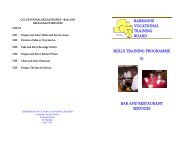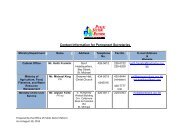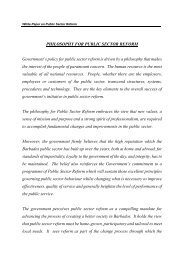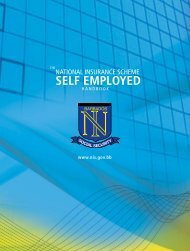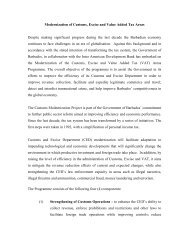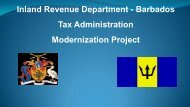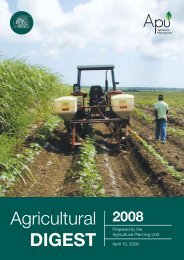PRDS Helping You To⦠- Office of Public Sector Reform
PRDS Helping You To⦠- Office of Public Sector Reform
PRDS Helping You To⦠- Office of Public Sector Reform
Create successful ePaper yourself
Turn your PDF publications into a flip-book with our unique Google optimized e-Paper software.
<strong>PRDS</strong> helping you to…<br />
improve your efficiency, and your organisation’s overall output<br />
1
ICB full page ad<br />
2
CHALLENGE TO CHANGE<br />
Vol. 10 No.3 Sept - December 2007<br />
A <strong>Public</strong>ation <strong>of</strong><br />
The <strong>Office</strong> <strong>of</strong> <strong>Public</strong> <strong>Sector</strong> <strong>Reform</strong><br />
E. Humphrey Walcott Building<br />
Cr. Collymore Rock &<br />
Culloden Road<br />
Telephone 467-4400<br />
Fax: 429-6089<br />
E-mail: Feedback@reform.gov.bb<br />
Website: www.reform.gov.bb<br />
Contributors:<br />
Ministry <strong>of</strong> Health<br />
- Denise Carter-Taylor<br />
Network Services Centre<br />
National HIV/AIDS Commission<br />
- Fabian Todd<br />
- Marilyn Sealy<br />
Customs & Excise Department<br />
- Andrew Gittens<br />
- The Performance Review &<br />
Development System Unit<br />
Barbados Fire Service<br />
Marva Hinds<br />
Government Information<br />
Service<br />
Photography:<br />
Nation Publishing Company<br />
Karl Smith<br />
Government Information Service<br />
Layout:<br />
Jennifer Ward -Garnes<br />
Cartoons:<br />
Guy O’Neal<br />
Please keep sending your letters and let us<br />
know what you think about this publication.<br />
Ideas or initiatives are always welcome to<br />
improve the <strong>Public</strong> <strong>Sector</strong> <strong>Reform</strong> process.<br />
Contents<br />
The Challenge to Wellness 4 – 5 & 23<br />
The Employee Assistance Programme<br />
Seeking to address Stress<br />
Management in the workplace 6 – 7<br />
National HIVAIDS Commission<br />
forgoing ahead with its mandate 8 – 9<br />
Why ‘Behaviour Change<br />
Communication’ 10 – 11<br />
The Modernization <strong>of</strong> Customs,<br />
Excise and Value Added Tax Areas 12 – 13<br />
Leading Human Resource<br />
Practitioner retires from the<br />
<strong>Public</strong> Service 14 – 15<br />
The Performance Review &<br />
Development System:<br />
All <strong>You</strong> Need to Know!! 16 - 17<br />
<strong>Public</strong> <strong>Office</strong>rs get Vital<br />
Training in Process<br />
Re-engineering 18<br />
“Operation Reinvention:<br />
Stepping Up and Stepping Out” 18-19<br />
Finally a Procedures Manual<br />
To assist the Registry Function 19<br />
The Challenge <strong>of</strong> Establishing a<br />
Wellness Group in the <strong>Public</strong><br />
Service 20 - 21<br />
Another Government Agency<br />
Making Convenience a Priority 22<br />
“In charity there is<br />
no excess……” 22<br />
Appointments On Promotion 24<br />
3
The Challenge to Wellness<br />
WHAT ARE CNCDs<br />
Of the 190,000 Barbadians aged<br />
20 years and older, 90,000 are<br />
overweight, 38,000 suffer from<br />
hypertension or high blood<br />
pressure, 19,000 are diabetic, and<br />
one person suffers a stroke every<br />
day.<br />
Dr. Hennis, Head <strong>of</strong> the Chronic Disease Research Centre<br />
The chronic non-communicable diseases<br />
are a group <strong>of</strong> medical conditions that include<br />
heart disease, type 2 diabetes, hypertension, or<br />
high blood pressure, obesity, stroke, and some<br />
cancers such as <strong>of</strong> the breast, prostate and cervix.<br />
These conditions share many features. They<br />
develop over relatively long periods initially<br />
without causing any symptoms after which<br />
evidence <strong>of</strong> disease occurs with protracted periods<br />
<strong>of</strong> ill health, impairment <strong>of</strong> quality <strong>of</strong> life, and<br />
premature death. Chronic non-communicable<br />
diseases may be controlled and their onset<br />
delayed. They are partly genetic and lifestyle<br />
related with the diseases occurring in middle or<br />
older age after prolonged exposure to modifiable<br />
lifestyle behaviours and environmental risk<br />
factors. Lack <strong>of</strong> physical activity, high caloric<br />
intake, increased consumption <strong>of</strong> foods high in<br />
fat content, and tobacco smoking all contribute to<br />
large numbers <strong>of</strong> the population being diagnosed<br />
with the above disorders.<br />
ALARMING DEATH RATES<br />
In our region the burden <strong>of</strong> the chronic<br />
non communicable diseases is no less startling,<br />
thus for example the CNCDs account for more<br />
than half <strong>of</strong> all deaths in our region, and <strong>of</strong> these<br />
deaths 30 % are due to heart disease. Heart<br />
disease is the leading cause <strong>of</strong> death in 31 <strong>of</strong> the<br />
35 countries in Latin America and the Caribbean,<br />
and it is estimated that heart disease will cause<br />
3 times more death and disability than infectious<br />
diseases over the next 20 years in this region.<br />
Over the past 50 years here in Barbados,<br />
there has been an epidemiological transition in<br />
the pattern <strong>of</strong> disease, changing from infectious<br />
and communicable disease to that <strong>of</strong> noncommunicable<br />
diseases, which include the 5<br />
leading causes <strong>of</strong> death in our country. The<br />
CNCDs now kill more persons worldwide than<br />
malaria, tuberculosis, HIV/AIDS and several<br />
other infectious diseases combined. Indeed, the<br />
WHO estimates that CNCDs account for 60% <strong>of</strong><br />
deaths globally and almost half (49.5%) <strong>of</strong> the<br />
global burden <strong>of</strong> disease.<br />
DEVELOPMENT COST<br />
The CNCDs have the potential to affect every<br />
individual, every family and every community<br />
directly or indirectly and, by extension, can<br />
impact significantly on the socio-economic<br />
development <strong>of</strong> Barbados.<br />
In terms <strong>of</strong> cost, it is estimated that more than<br />
65% <strong>of</strong> the Queen Elizabeth Hospital’s budget<br />
provides for CNCD care. In the 7 month period<br />
April-October 2004 the Barbados Drug Service<br />
paid out approximately 16 million dollars on<br />
drugs used in the treatment <strong>of</strong> CNCDs. Indirect<br />
costs for diabetes, i.e. loss <strong>of</strong> productivity,<br />
sickness, benefits, and loss <strong>of</strong> earnings due to<br />
4
premature death have been calculated at more<br />
than 138 million US dollars annully.<br />
WHAT NEEDS TO BE DONE<br />
Despite the many challenges, there is,<br />
nevertheless, much that can be done to slow<br />
and delay the epidemic <strong>of</strong> the CNCDs. This<br />
requires two approaches, firstly, a reduction<br />
in the modifiable risk factors for chronic noncommunicable<br />
diseases thus leading to the<br />
postponement <strong>of</strong> these diseases resulting<br />
in healthier older people and, secondly,<br />
establishment <strong>of</strong> cost effective programmes to<br />
treat the chronic non-communicable diseases<br />
when they do occur.<br />
GOVERNMENT ACTION<br />
The Ministry <strong>of</strong> Health has, over the past several<br />
years, attempted to deal with the chronic noncommunicable<br />
diseases by establishing treatment<br />
programmes and addressing the modifiable risk<br />
factors for the Chronic Non-Communicable<br />
Diseases; and, in its Barbados Strategic Plan<br />
for Health, 2002-2010 identified Tackling <strong>of</strong><br />
the Chronic Non-Communicable Diseases as a<br />
national priority. In 2004, the Ministry <strong>of</strong> Health<br />
published a defining document titled Strategy<br />
for the Prevention and Control <strong>of</strong> CNCDs which<br />
called for ,among other things, the establishment<br />
<strong>of</strong> a CNCD Commission. In the following year<br />
the Ministry <strong>of</strong> Health sponsored International<br />
Consultation on a Strategy for the Prevention<br />
and Control <strong>of</strong> Non-Communicable Diseases for<br />
Barbados.<br />
THE ROLE OF THE COMMISSION<br />
In January, the Health Ministry established the<br />
National Chronic Non-Communicable Diseases<br />
Commission which consists <strong>of</strong> 18 members<br />
whose expertise and disciplines are gathered<br />
from a wide cross section <strong>of</strong> the community. The<br />
National CNCD Commission’s mandate will be<br />
to develop and promote well planned strategies<br />
for the control <strong>of</strong> CNCDs with specific emphasis<br />
on an inter-sectoral and multidisciplinary<br />
approach. It will advise the Ministry <strong>of</strong> Health<br />
on CNCD policies and legislation, e.g. in relation<br />
to food availability, workplace issues, measures<br />
to increase participation in physical activity and<br />
tobacco control. The Commission will be the<br />
focal point <strong>of</strong> activity drawing on the expertise and<br />
disciplines from all aspects <strong>of</strong> society; forming<br />
partnerships with the Ministry <strong>of</strong> Education,<br />
<strong>You</strong>th Affairs and Sports, the Ministry <strong>of</strong><br />
Agriculture, the Ministry <strong>of</strong> Finance, Corporate<br />
Barbados, Non-governmental Organisations, the<br />
Audio visual and print media and community<br />
groups. It is anticipated that urgent areas to be<br />
addressed will be risk reduction, evaluation and<br />
planning, education and information systems.<br />
“The Commission has the potential to<br />
serve as a focal point, be an umbrella<br />
body, a national resource, facilitator,<br />
an advocacy body and an instrument<br />
for positive change aimed at slowing<br />
and delaying the onset <strong>of</strong> the epidemic<br />
<strong>of</strong> the chronic non-communicable<br />
diseases.”<br />
Pr<strong>of</strong>essor Trevor Hassell, Chairman <strong>of</strong> the National Chronic<br />
Non-communicable Diseases Commission<br />
A CNCD REGISTRY<br />
In addition to the Commission, the Ministry <strong>of</strong><br />
Health in Barbados is the first in the Eastern<br />
Caribbean to establish a CNCD Registry. By<br />
documenting the incidence, natural history<br />
and outcomes <strong>of</strong> cases <strong>of</strong> CNCDs the Ministry<br />
will be more effective in planning policies and<br />
programmes based on evidence. Within recent<br />
time, there have been major concerns about the<br />
lack <strong>of</strong> sufficient data and information to guide<br />
financial, human resource and social policies.<br />
Other initiatives that have been implemented<br />
include the establishment <strong>of</strong> a Health Promotion<br />
Unit and the creation <strong>of</strong> the post Senior Medical<br />
health <strong>Office</strong>r with responsibility for the<br />
CNCDs.<br />
SMART PARTNERSHIPS<br />
To further strengthen the evidence base for<br />
action on CNCDs, the Ministry <strong>of</strong> Health and<br />
the Barbados Statistical Service (BSS) have<br />
conducted a Behavioural Risk Factor Survey<br />
which investigates lifestyle habits including<br />
diet, physical activity, smoking and other<br />
health seeking behaviours among a sample <strong>of</strong><br />
the population. Through this key alliance with<br />
the BSS, it is anticipated that such data will be<br />
collected on a continuous basis.<br />
Continued on page 23<br />
5
The Employee Assistance Programme<br />
seeking to address Stress Management<br />
in the workplace<br />
Modern Life with its de-emphasis<br />
on community and its emphasis<br />
on individual pursuits and<br />
achievements has resulted in ever<br />
spiralling levels <strong>of</strong> stress on its<br />
unsuspecting subjects.<br />
Stress has become the buzz word in the last two<br />
decades or so with many physical and emotional<br />
problems being linked to it. Medical practitioners<br />
are becoming increasingly more attuned to<br />
the psychological impact <strong>of</strong> environment or<br />
people’s health and, in some cases, are ruling out<br />
physical and physiological causation in favour<br />
<strong>of</strong> exploring the impact <strong>of</strong> stress. The teaching<br />
pr<strong>of</strong>ession has been impacted significantly by the<br />
force <strong>of</strong> modernity which has brought changes<br />
in value system and ushered in an era <strong>of</strong> rights<br />
over responsibility. This has resulted in many<br />
teachers seeking assistance for the high levels<br />
<strong>of</strong> stress either personally or referred by their<br />
medical practitioner. Network Services Centre<br />
in conjunction with the <strong>Office</strong> <strong>of</strong> <strong>Public</strong> <strong>Sector</strong><br />
<strong>Reform</strong> has been conducting Stress Management<br />
workshops for Teachers as a preventative<br />
response to this reality.<br />
Network Services Centre Inc. located at Kingston Terrace,<br />
Welches, St. Michael<br />
These workshops are geared toward a<br />
Behavioural Approach to managing stress and<br />
therefore seek to 1. Help persons to understand<br />
the stress dynamic and its impact on physical/<br />
emotional health; 2. Build an awareness <strong>of</strong> how<br />
our bodies indicate to us when we are under<br />
stress; and 3. Equip the participants with the<br />
relevant tools for dealing with stress.<br />
In understanding the stress dynamics, it is<br />
vitally crucial to recognise and underscore the<br />
role that some jobs and personal issues play in<br />
this stress dynamics. According to Dennis Jaffe<br />
we spend approximately sixty percent <strong>of</strong> our<br />
waking productive lives at work. This being a<br />
truth, it means that work becomes a significant<br />
factor in our stress level. Work is primarily<br />
about “performance”, family life is about<br />
“acceptance and care”. It is our retreat from<br />
work. When work is stressful and family life<br />
is stressful it creates a sandwiching effect<br />
thus reinforcing and increasing our stress<br />
level. Stress impacts our bodies in a similar<br />
way to how fear impacts on us; increased<br />
levels <strong>of</strong> blood pressure and heart rate;<br />
increased perspiration; increased secretion<br />
<strong>of</strong> acids in the stomach, thereby setting <strong>of</strong>f<br />
gastro-intestinal issues and a plethora <strong>of</strong><br />
other responses.<br />
This, therefore, creates tremendous strain<br />
on the heart and circulatory system thereby<br />
creating a greater risk for heart disease in<br />
6
those that are stressed out. Frankly, stress has<br />
the ability to kill.<br />
The second phase <strong>of</strong> the seminar is to build on<br />
awareness <strong>of</strong> how the body signals to us when<br />
we are distressed. The seminar pays attention to<br />
the physical symptoms such as stooped posture,<br />
galvanic issues, as well as muscular and nerve<br />
pains. The emotional warning signals or red<br />
flags are also explored with a view to helping<br />
individuals to identify their stress map or the<br />
conflagration <strong>of</strong> symptoms that indicate when<br />
they are under stress. We recommend that<br />
participants become aware and in tune with<br />
their bodies so that they can identify when their<br />
stress level has moved from Eustress, which is<br />
normative and healthy stress, to Distress, which<br />
is Destructive stress. We also invite participants<br />
to take a number <strong>of</strong> tests to identify their stress<br />
levels.<br />
Having understood what stress is and its impact<br />
on the body, as well as our warning signals, we<br />
then move full throttle into equipping persons<br />
with tools to combat stress. Firstly, it is important<br />
that persons change their paradigm from being<br />
victim to being co-creators.<br />
In my nearly 15 years as a<br />
counsellor I have found that<br />
persons who have a life’s plan<br />
and definite goals are able to<br />
handle the rigors <strong>of</strong> life better.<br />
Persons are challenged in the session to make<br />
a personal evaluation <strong>of</strong> their life by answering<br />
three questions, “who am I”, “what makes me<br />
happy”, “where do I want to go”. The participants<br />
are challenged to make some definite decisions in<br />
their lives to reduce and manage their stress.<br />
There are some stressors which have become<br />
normative in teaching. Therefore, developing<br />
appropriate coping skills become necessary. The<br />
seven R’s for coping with stress are emphasised:<br />
1. Reframing – finding a purpose that<br />
transcends the challenges <strong>of</strong> the job and give<br />
meaning to what you do. As Confucius once<br />
said “Once there is a “why” I can handle the<br />
“what.”<br />
2. Relaxation – creating stress breaks<br />
through the day as well as a buffer zone<br />
between school and other activities.<br />
Breathing and visualisation techniques are<br />
taught.<br />
3. Rest – Adequate rest is <strong>of</strong> necessity to<br />
managing one’s stress level.<br />
4. Resolution – needing to resolve conflict<br />
quickly so that one’s inner life is not<br />
contaminated. Our mental disposition can<br />
create internal stress.<br />
5. Recreation – Exercise actually mitigates<br />
against the effects <strong>of</strong> stress and can result in<br />
a lowering <strong>of</strong> blood pressure and sugar level<br />
in the blood stream. The natural endorphins<br />
that are produced through exercise gives the<br />
mind a sense <strong>of</strong> calm and tranquillity.<br />
6. Relationship – creating at least one<br />
relationship <strong>of</strong> transparency where you can<br />
be honest and share your deepest concerns.<br />
This can be cathartic as you express pent up<br />
feelings.<br />
7. Religion - cultivating faith in God<br />
which creates a sense <strong>of</strong> security and<br />
empowerment.<br />
Our faith gives us meaning and purpose in life but<br />
it <strong>of</strong>ten gives us the strength to handle difficult<br />
Anderson Kellman<br />
Psychologist -<br />
Counsellor<br />
Network Services<br />
Centre Inc.<br />
7
National HIV /AIDS Commission forging<br />
ahead with its mandate<br />
From left to right: Director, Alies Jordan, Fabian Todd, Marilyn Sealy, Ingrid Miller, Rhonda Greenidge,<br />
Claudia Clarke, Deputy Director, Lynn Armstrong and Angela Gibbons.<br />
Since its establishment in 2001, the Barbados<br />
National HIV/AIDS Commission (NHAC) has<br />
remained ever vigilant in executing its mandate <strong>of</strong><br />
creating and strengthening partnerships which, in<br />
turn, foster an expanded response to HIV across all<br />
sectors.<br />
This vision <strong>of</strong> the Prime Minister, to move<br />
the coordination <strong>of</strong> the National AIDS Programme<br />
(NAP) from the Ministry <strong>of</strong> Health to the Prime<br />
Minister’s <strong>Office</strong> and the establishment <strong>of</strong> the<br />
NHAC in 2001, was a signal that AIDS was no<br />
longer being seen as primarily a health issue but one<br />
which affected national development.<br />
No longer should the national response to<br />
HIV be medical in orientation but social, economic,<br />
cultural and legal. No longer was HIV to be regarded<br />
as the sole purview <strong>of</strong> the Health Ministry but <strong>of</strong><br />
each and every Barbadian working towards the<br />
sustainable development <strong>of</strong> our nation. Gone are the<br />
days when the national strategic partners did their<br />
own thing. The national multi-sectoral expanded<br />
response was born.<br />
These partnerships saw the training <strong>of</strong> HIV<br />
coordinators and educators in all government<br />
ministries and over time connecting and sensitising<br />
government, the private sector and civil society<br />
about the shared responsibility <strong>of</strong> mitigating the<br />
impact <strong>of</strong> this epidemic on our population.<br />
The NHAC was now the flagship <strong>of</strong> the<br />
NAP and faced the daunting task <strong>of</strong> harmonising<br />
the various micro-level responses. This difficulty<br />
was further compounded by the diversity <strong>of</strong><br />
programming, agency territoriality, limited<br />
knowledge and understanding <strong>of</strong> HIV and AIDS<br />
and a dearth <strong>of</strong> funds with which to implement<br />
programmes.<br />
The successful harmonisation <strong>of</strong> partners<br />
within the NAP was achieved in a very systematic<br />
way: the formation <strong>of</strong> a coordinating body<br />
representing government, private sector and civil<br />
society including a member <strong>of</strong> the persons living<br />
with HIV (PLHIV) community; development <strong>of</strong> a<br />
8
tiered approach to national involvement <strong>of</strong> partners;<br />
sensitisation <strong>of</strong> in excess <strong>of</strong> 75% <strong>of</strong> government<br />
employees about HIV and related issues; initially<br />
working with eight (8) Ministries to develop and<br />
strengthen their Ministry-level AIDS Programmes<br />
and develop programme monitoring tools and an<br />
monitoring and evaluation plan, with the gradual<br />
extension <strong>of</strong> the programme to all Ministries; ongoing<br />
training in programme planning, implementation,<br />
monitoring and evaluation to build capacity to<br />
enable strategic partners to engage in programming<br />
activities; and monthly HIV Coordinators’ meetings<br />
which create a forum for idea and information<br />
sharing, programme planning and coordination,<br />
problem resolution and general NAP feedback.<br />
NHAC notable milestones<br />
Much has been achieved by the Commission<br />
since its inception. The most recent being the<br />
2007 – Cricket World Cup HIV Prevention Mass<br />
Media Campaign. The objectives <strong>of</strong> this intensive<br />
programme was to remind persons participating in<br />
cricketing events that they should behave responsibly<br />
by using condoms every time they engaged in<br />
sexual activities and to communicate the message<br />
that anyone could be infected, and everyone should<br />
seek to and could protect themselves.<br />
It was clear from the results that the<br />
campaign achieved most <strong>of</strong> the stated aims and<br />
objectives. Among the notable achievements was<br />
the fact that a significant number <strong>of</strong> the respondents<br />
indicated that they made changes to their lifestyle<br />
as a direct result <strong>of</strong> the messages emanating from<br />
the campaign.<br />
The Commission remains fully involved in<br />
all aspects <strong>of</strong> HIV awareness in Barbados and has<br />
been coordinating a HIV sensitisation programme<br />
for public service, carrying out capacity building <strong>of</strong><br />
government, private sector and civil society partners<br />
in: programme management; behaviour change<br />
communication; and monitoring and evaluation.<br />
There has also been the formation <strong>of</strong> active subcommittees<br />
<strong>of</strong> the Commission in the following<br />
areas: abstinence, youth, research, prevention and<br />
faith-based. Sports persons and entertainers have<br />
also been mobilized to form the Sports Champions<br />
and Entertainment Champions, respectively.<br />
To date, the Commission continues to execute<br />
a vibrant HIV Coordinators and Focal Point<br />
partnership forum as epitomised by the monthly<br />
coordinators’ meetings; inter-agency collaborations<br />
and involvement <strong>of</strong> government, private sector<br />
and civil society. Through this partnership the<br />
Commission has been able to develop a Monitoring<br />
and Evaluation Framework and Behaviour Change<br />
Communication Strategy with major input from all<br />
stakeholders.<br />
Universal Access: Engaging our Civil<br />
Society Partners<br />
Universal Access (UA) is certainly not a<br />
new initiative, merely a new approach to ensuring all<br />
persons in need have access to treatment. However,<br />
this process <strong>of</strong> Anti-Retro Viral provision should<br />
not occur in isolation, instead the push was for the<br />
scaling up towards universal access to prevention,<br />
treatment, care and support services. In Barbados,<br />
this is especially important, given the country’s size<br />
and extreme resource limitations.<br />
Experience has taught the National HIV/<br />
AIDS Programme that standard mobilisation efforts<br />
will capture government and private sector partners.<br />
Conversely, engaging civil society partners is<br />
neither easy nor is it straightforward. Unanimous<br />
agreement that our civil society partners must be<br />
fully involved, started with inviting them to the<br />
three-day Universal Access Consultation held from<br />
January 31 – February 2, 2006 and ensuring they<br />
were active participants in formulating targets for<br />
attaining universal access by 2010.<br />
Subsequent meetings to refine the targets<br />
did not preclude civil society involvement. These<br />
meetings have been interspersed with UA-related<br />
capacity building activities.<br />
Assured <strong>of</strong> the commitment <strong>of</strong> its<br />
government and private sector partners, the National<br />
HIV/AIDS Commission (NHAC) hosted a special<br />
consultation on UA for its civil society partners on<br />
July 16, 2007 at the Blue Horizon Hotel. What was<br />
unique about the consultation was the movement<br />
away from a mere sharing <strong>of</strong> ideas to orienting our<br />
partners on the nuances <strong>of</strong> UA and encouraging<br />
discussion and interventions to clarify any pressing<br />
concerns or issues. The highlight <strong>of</strong> the consultation<br />
was the review <strong>of</strong> the UA targets by our partners<br />
and their willing commitment to work alongside<br />
other partners to realise the goal <strong>of</strong> universal access<br />
to prevention, treatment, care and support by 2010.<br />
Fabian Todd<br />
<strong>Public</strong> Relations <strong>Office</strong>r<br />
National HIV/AIDS<br />
Commission<br />
9
Why ‘Behaviour Change<br />
Communication’<br />
There is much evidence e to prove that the<br />
National<br />
AIDS Programme (NAP) has achieved high levels <strong>of</strong><br />
awareness <strong>of</strong> HIV/AIDS, its transmission, prevention<br />
and treatment across all age groups. However,<br />
the NAP has been less successful in inducing and<br />
sustaining change in behaviours that would result in<br />
the control <strong>of</strong> the epidemic.<br />
This situation is frequently referred to as a KAP<br />
(knowledge, Attitudes and Practices) gap, where<br />
almost everyone has heard about HIV and the its<br />
prevention methods but there has been no concomitant<br />
change in their behaviour to adopt the methods<br />
known. Furthermore, even if some individuals decide<br />
to adopt one or more prevention behaviours, there<br />
are those who are not continuously practicing these<br />
behaviours.<br />
One <strong>of</strong> the reasons for the high levels <strong>of</strong> knowledge<br />
is the fact that very early in the local epidemic, the<br />
NAP sought to use Information, Education and<br />
Communication (IEC) to<br />
develop communication<br />
strategies to promote<br />
positive behaviours.<br />
However, this approach was<br />
a very undirectional way<br />
<strong>of</strong> conveying information<br />
to, in most cases, passive<br />
recipients. Furthermore,<br />
there was, in many ways, no<br />
supportive environment to<br />
enable individuals to practice<br />
safer sexual behaviours.<br />
The bottom line is that, IEC<br />
campaigns are <strong>of</strong>ten better at<br />
imparting knowledge and information than they are<br />
at inspiring behaviour change.<br />
To this end, the National HIV/AIDS Commission<br />
has sought to implement behaviour change<br />
communication as a key component <strong>of</strong> the NAP.<br />
Behaviour Change Communication is a process <strong>of</strong><br />
working with individuals, communities and societies<br />
to develop communication strategies to promote<br />
positive behaviours and provide a supportive<br />
environment. BCC recognizes that presenting facts<br />
alone does not ensure behaviour change. BCC<br />
strategies are therefore designed to accommodate the<br />
stage <strong>of</strong> behaviour adoption <strong>of</strong> an individual or group<br />
and to cultivate skills integrally needed to enable and<br />
sustain change.<br />
BCC comprises targeted interventions within<br />
vulnerable populations. HIV programmers first have<br />
to assess the vulnerability and risk factors <strong>of</strong> the<br />
population, as well as the motivators and barriers to<br />
behaviour change. Appropriate messages then have<br />
to be designed using the correct media and channels<br />
to disseminate the relevant information.<br />
In addition, a system for accessibility<br />
<strong>of</strong> services and resources has to be<br />
implemented.<br />
Inspiring behaviour change is <strong>of</strong>ten<br />
a slow process. It is usually a series<br />
<strong>of</strong> different influences that reach<br />
the individual. It could be a panel<br />
discussion, an awareness concert,<br />
brochure or a television advertisement.<br />
It should also be noted that the road to<br />
behaviour change is not straight and<br />
clear. There can be detours, stops and<br />
starts and even the loss <strong>of</strong> the ground<br />
gained. The behaviour change continuum describes<br />
the levels <strong>of</strong> change that people <strong>of</strong>ten go through<br />
from becoming aware they have a problem to making<br />
and sustaining positive change. The levels <strong>of</strong> change<br />
include individuals being unaware, aware/concerned,<br />
knowledgeable and skilled, motivated and ready to<br />
change, trial change <strong>of</strong> behaviour and maintenance/<br />
adoption <strong>of</strong> the new behaviour.<br />
With the assistance <strong>of</strong> the World Bank, the<br />
Commission is adopting a five-year behaviour change<br />
10
interventions directed to influence the individual while<br />
ensuring an ‘environment’ that enables and supports<br />
the individual to maintain the new behaviour.<br />
communication (BCC) strategy, to achieve a shift<br />
in behaviour adoption that is required if a change<br />
in the progress <strong>of</strong> the epidemics is to be achieved.<br />
Transmission <strong>of</strong> HIV in Barbados is primarily<br />
through unprotected sexual contact. Therefore,<br />
the BCC priorities <strong>of</strong> the Commission have been<br />
classified on the basis <strong>of</strong> sexual activity. Three groups<br />
<strong>of</strong> individuals have been identified: those who never<br />
had sexual intercourse, those who have had sexual<br />
intercourse but have chosen secondary abstinence<br />
and those who currently are sexually involved.<br />
The goals <strong>of</strong> the BCC efforts are two-fold: positively<br />
affecting the current epidemics by seeking to reduce<br />
HIV primary infection rates and, influencing future<br />
disease trends by changing social norms about the<br />
timing <strong>of</strong> first sexual intercourse and gender norms<br />
associated with sexual partnering and condom use.<br />
BCC interventions will be guided by the following<br />
principles: theory-based, culturally sensitive, gender<br />
sensitive and gender specific, training <strong>of</strong> all partners,<br />
appropriate selection and use <strong>of</strong> communication<br />
approaches, inclusion <strong>of</strong> strong monitoring and<br />
evaluation component, basic research, participation<br />
and involvement <strong>of</strong> vulnerable populations and the<br />
application <strong>of</strong> an intervention planning approach. In<br />
addition, all interventions will be multi-levelled i.e.<br />
Thus far, the Commission has hired a BCC specialist,<br />
whose responsibility it is to coordinate the rollout <strong>of</strong><br />
BCC in the NAP. The BCC strategy has been approved<br />
and is now integrated into the National Strategic Plan<br />
2007-2012 <strong>of</strong> the NAP. A BCC assessment was also<br />
conducted among key strategic partners in the NAP,<br />
the findings <strong>of</strong> which have guided the development<br />
<strong>of</strong> a training module. The inaugural BCC training for<br />
partners in the NAP was held November 19 – 23, 2007.<br />
The second BCC workshop was held on November<br />
19-26, 2007. It is anticipated that by the end <strong>of</strong><br />
the current financial year more than 50 individuals<br />
from the public and private sector as well as nongovernmental<br />
organizations who are involved in HIV<br />
programming would have been trained in BCC.<br />
Based on research, the Commission very shortly<br />
will be undertaking the design and production <strong>of</strong><br />
BCC interventions. The goals <strong>of</strong> these interventions<br />
are: delaying sexual debut, consistent condom use<br />
among men, increase HIV testing, drug adherence<br />
and healthy positive living among persons living with<br />
HIV (PLHIV).<br />
Marilyn Sealy,<br />
Behaviour<br />
Change Communication<br />
Specialist, NHAC<br />
11
The Modernization <strong>of</strong><br />
Customs, Excise and<br />
Value Added Tax Areas<br />
Despite making significant i<br />
nt progress during the<br />
last decade d the Barbadian economy continues to<br />
face challenges in an era <strong>of</strong> globalisation. Against<br />
this background and, in accordance with the stated<br />
intention <strong>of</strong> transforming the tax system, the<br />
Government <strong>of</strong> Barbados, in collaboration with the<br />
Inter- American Development Bank has embarked on<br />
the Modernization <strong>of</strong> the Customs, Excise and Value<br />
Added Tax (VAT) Areas Programme. The overall<br />
objective <strong>of</strong> the programme is to assist the Government<br />
in its efforts to improve the efficiency <strong>of</strong> its Customs<br />
and Excise Department in order to improve revenue<br />
collection; facilitate and expedite legitimate commerce<br />
and travel; detect and interdict transnational crime, and<br />
help improve Barbados’ competitiveness in the global<br />
economy.<br />
The Customs Modernization Project is part <strong>of</strong> the<br />
Government <strong>of</strong> Barbados’ commitment to further<br />
public sector reform aimed at improving efficiency and<br />
economic performance. Since the last decade, the tax<br />
system has been transformed by a series <strong>of</strong> initiatives.<br />
The first steps were taken in 1992, with a simplification<br />
<strong>of</strong> personal income tax.<br />
Customs and Excise Department (CED) modernization<br />
will facilitate adaptation to impending technological<br />
and economic developments that will significantly<br />
change the environment in which productive<br />
investment and foreign trade take place. In addition,<br />
by raising the level <strong>of</strong> efficiency in the administration<br />
<strong>of</strong> Customs, Excise and VAT, it aims to mitigate the<br />
revenue reduction effects <strong>of</strong> current and expected<br />
changes, while also strengthening the CED’s law<br />
enforcement capacity in areas such as illegal narcotics,<br />
illegal firearms and ammunition, commercial fraud,<br />
money laundering and terrorism.<br />
The Programme consists <strong>of</strong> the following four (4)<br />
components:<br />
Strengthening <strong>of</strong> Customs<br />
Operations<br />
To enhance the CED’s ability to collect revenue,<br />
enforce prohibitions and restrictions and other laws<br />
to facilitate foreign trade operations while improving<br />
controls; reduce administrative costs for users <strong>of</strong><br />
services provided by Customs; and, reduce the cost<br />
<strong>of</strong> customs administration. The deliverables for this<br />
component include: (i) implementation <strong>of</strong> a postclearance<br />
audit system aimed at formalizing a risk<br />
analysis methodology as a standard procedure; (ii)<br />
training <strong>of</strong> IT human resources in Internet-related<br />
technologies in order to adequately prepare staff<br />
to deal with new technologies; (iii) drafting <strong>of</strong><br />
Customs legislation reform, aimed at updating current<br />
legislation, taking into account recent advances in<br />
technology and modern procedures; (iv) establishment<br />
<strong>of</strong> an online authorization system for other agencies<br />
in order to provide an automated interface so that<br />
government agencies are able to authorize the<br />
clearance <strong>of</strong> goods in real time (e.g., health and<br />
agricultural related products); (v) implementation <strong>of</strong><br />
workflow and document management system aimed at<br />
establishing a system that will help automate customs<br />
procedures and provide support documents scanned<br />
and available through automated means; (vi) provision<br />
<strong>of</strong> IT infrastructure for the complete automation <strong>of</strong> the<br />
CED; and (vii) achievement <strong>of</strong> ISO 9001 certification<br />
in order to help the CED’s efforts to improve current<br />
procedures and quality.<br />
Modernising <strong>of</strong> the<br />
Administration <strong>of</strong> the Value Added<br />
Tax<br />
To improve the efficiency <strong>of</strong> VAT by strengthening<br />
the process <strong>of</strong> registration, certification, filing <strong>of</strong><br />
returns and payments, as well as the selection<br />
<strong>of</strong> audit cases and control. In this regard,<br />
the component will include the following<br />
deliverables: (i) development <strong>of</strong> a strategic IT plan<br />
aimed at facilitating the implementation <strong>of</strong> a new<br />
information system to manage the VAT system<br />
in Barbados; (ii) review <strong>of</strong> current legislation<br />
and the drafting <strong>of</strong> an amendment to the VAT<br />
legislation in order to allow for the incorporation<br />
<strong>of</strong> technological elements into the VAT system;<br />
(iii) development and implementation <strong>of</strong> a new<br />
information system providing tracking case<br />
assignment; selection <strong>of</strong> cases for auditing based<br />
on cross-referencing and risk analysis; arrears<br />
classification; systematic exchange <strong>of</strong> information<br />
among Customs and Excise Department, Inland<br />
Revenue Department and other agencies; (iv)<br />
establishment <strong>of</strong> a risk analysis strategy for audit<br />
selection, providing support for the selection <strong>of</strong><br />
12
cases, based on cross-referencing third-party<br />
information and risk analysis; and (v) execution<br />
<strong>of</strong> arrears collection clearance, which will allow<br />
for the handling and management <strong>of</strong> arrears<br />
accounts. The handling <strong>of</strong> case assignment and<br />
tracing will be based on criteria such as amount<br />
and age <strong>of</strong> debt or taxpayer history.<br />
Modernisation <strong>of</strong> Excise Taxes<br />
To reform the Excise control system, in particular to<br />
transform the system from the physical stationing <strong>of</strong><br />
<strong>of</strong>ficers in Excise facilities to a control system, relying<br />
mainly on periodic audits and a computerised system.<br />
This component includes the following deliverables:<br />
(i) development <strong>of</strong> a strategic plan for excise and new<br />
procedures and the definition <strong>of</strong> guidelines to improve<br />
current processes, especially those related to audit<br />
and control; (ii) review <strong>of</strong> legislation and drafting <strong>of</strong><br />
amendments in order to provide support for audit-based<br />
controls; (iii) the development <strong>of</strong> an IT strategic plan<br />
aimed at improving current procedures, including the<br />
specifications <strong>of</strong> a new information system to manage<br />
excise processes; and (iv) the implementation <strong>of</strong> new<br />
information systems, following the IT strategic plan in<br />
order to replace all current manual procedures.<br />
Strengthening <strong>of</strong> the Administrative<br />
Support Areas<br />
To reinforce the support areas <strong>of</strong> CED in order<br />
to provide a better service at a lower cost to technical<br />
areas. This component includes the following<br />
deliverables, (i) the development <strong>of</strong> personnel pr<strong>of</strong>iles<br />
and procedures manuals; (ii) the establishment <strong>of</strong> a<br />
training system and strengthening <strong>of</strong> policy, aimed<br />
at improving efficiency and effectiveness; (iii)<br />
implementation <strong>of</strong> permanent internal controls aimed<br />
at strengthening the monitoring <strong>of</strong> compliance and<br />
applicability <strong>of</strong> procedures and regulations; and (iv)<br />
establishment <strong>of</strong> a permanent planning system in order<br />
to increase productivity through better planning.<br />
Specifically, the programme seeks (i) to facilitate<br />
import and export trade and strengthen the Customs<br />
Administration by harmonizing and simplifying<br />
current procedures, improving the audit capacity<br />
and the institutional abilities to prevent and fight<br />
transnational crime and its negative consequences;<br />
(ii) to improve compliance with the VAT and Excise<br />
Tax obligation through the modernization <strong>of</strong> the<br />
main administrative processes, especially those<br />
corresponding to tax collection and audit; (iii) to<br />
strengthen the Department’s institutional management<br />
capacity through the improvement <strong>of</strong> administrative<br />
processes and the implementation <strong>of</strong> mechanisms for<br />
the integration and strengthening <strong>of</strong> support systems<br />
(planning, internal control and human resources<br />
management).<br />
Apart from improving the collection <strong>of</strong> customs<br />
revenue, the programme also seeks to reduce the<br />
average clearance time for imports and exports; a<br />
reduction in VAT arrears; a reduction in filing late<br />
returns, electronic filing <strong>of</strong> VAT returns, a reduction in<br />
the time to process VAT refunds, and a reduction in the<br />
operational costs for the Excise Division.<br />
The total cost <strong>of</strong> the programme is estimated at $11<br />
million <strong>of</strong> which $8.8 million will be financed by<br />
the Bank as a reimbursable loan. The Government<br />
<strong>of</strong> Barbados will contribute $2.2 million. Given the<br />
scope <strong>of</strong> the project, the technical execution which<br />
commenced in January <strong>of</strong> this year is estimated to be<br />
completed in 42 months.<br />
In order to effectively manage the program a<br />
structure consisting <strong>of</strong> a Steering Committee, Project<br />
Coordinating Unit and four working teams at the<br />
level <strong>of</strong> beneficiary units has been established. The<br />
responsibility <strong>of</strong> the Steering Committee is to give<br />
strategic and policy directives on the project. The<br />
Committee comprises representatives from the<br />
Customs and Excise Department, the Ministry <strong>of</strong><br />
Finance, the Audit Department, Data Processing<br />
Department, Statistical Services, Accountant General’s<br />
<strong>Office</strong>, Barbados Chamber <strong>of</strong> Commerce and the<br />
Barbados Customs Brokers and Clerks Association.<br />
The day to day activities are managed by a Project<br />
Coordinating Unit headed by a Project Coordinator.<br />
The Programme comprises activities that involve<br />
the organisation <strong>of</strong> Work Teams whose function is to<br />
undertake the execution <strong>of</strong> activities applicable to (i)<br />
Customs; (ii) Excise; (iii) Value Added Tax; and (iv)<br />
the Administration Division.<br />
It is envisaged that the successful implementation<br />
<strong>of</strong> this programme will help improve Barbados’<br />
competitiveness as the country seeks to sustain<br />
economic growth and development in a global<br />
environment.<br />
Andrew Gittens<br />
Project Coordinator<br />
Modernization <strong>of</strong> Customs, Excise and<br />
Value Added Tax, Project Unit.<br />
13
Leading Human<br />
Resource Practitioner<br />
retires from the <strong>Public</strong><br />
Service<br />
‘The greater good for the greater many’ was but<br />
one <strong>of</strong> the guiding principles that outgoing acting<br />
Permanent Secretary, Sylvester Welch abided<br />
by throughout his thirty eight (38) year public<br />
service career. Welch or ‘Welchie’ as he was<br />
popularly known, said that he believed that the<br />
public service was one <strong>of</strong> the best places to work,<br />
although he admitted that it had its challenges.<br />
Welch’s career was built on tenacity,<br />
commitment, loyalty and the simple principles<br />
<strong>of</strong> “an honest day’s work for an honest day’s<br />
pay.” Welch met each day’s challenge headon<br />
ensuring that at the end <strong>of</strong> the day he made<br />
recommendations “for the greater good for the<br />
greater many” and which did not contravene any<br />
public service rule or regulation nor disobey any<br />
law <strong>of</strong> the land.<br />
Welch stated that throughout his career he<br />
has had the opportunity to meet wonderful people,<br />
be part <strong>of</strong> new and innovative programmes<br />
and represent government at various regional<br />
and international functions. Welch indicated<br />
that there were periods when he had to endure<br />
difficult times, and make principled stands, “but<br />
once these stands were based on equity and not<br />
by who or what someone was, I was able to sleep<br />
at night, knowing that my judgement could not<br />
be faulted.”<br />
The Rise to acting Permanent Secretary<br />
At the tender age <strong>of</strong> 17 “Welchie” started<br />
his public service career as a temporary<br />
Clerical <strong>Office</strong>r assigned to the Queen Elizabeth<br />
Hospital. He was later appointed and assigned<br />
to the Water Works Department where he would<br />
spend nineteen (19) years, as Clerical <strong>Office</strong>r,<br />
Senior Clerk, Assistant Personnel <strong>Office</strong>r and<br />
Personnel <strong>Office</strong>r. It was during these years that<br />
Welch’s interest in Human Resource Management<br />
(HRM) was sparked. This interest in HRM was<br />
further intensified when he was assigned to the<br />
post <strong>of</strong> Senior Personnel <strong>Office</strong>r at the Ministry<br />
<strong>of</strong> Health; during this assignment Welch solidified<br />
his Human Resource experience by successfully<br />
completing a Masters degree in Human Resource<br />
Management. His next assignment was with the<br />
Personnel Administration Division (PAD) as a<br />
Principal Personnel <strong>Office</strong>r. This assignment<br />
was to prepare him for the Deputy Permanent<br />
Secretary Post to which he would be appointed<br />
by December 2004. As Welch approached his<br />
last assignment, that <strong>of</strong> Permanent Secretary<br />
(ag), Training Administration Division, he had<br />
completed a full spectrum <strong>of</strong> leadership roles<br />
in the management <strong>of</strong> Human Resource in the<br />
public service.<br />
Achievements<br />
During Welch’s tenure at the Ministry <strong>of</strong> Health<br />
he was part <strong>of</strong> the administrative team that laid<br />
the ground work for the provision <strong>of</strong> open heart<br />
surgery in Barbados, and as Senior Personnel<br />
<strong>Office</strong>r he was primarily responsible for the<br />
additional staffing required for the new cardiac<br />
unit. Welch also spearheaded the coordination <strong>of</strong><br />
the Ministry’s Human Resources Strategic Plan<br />
for the period 1995-2000. This plan brought about<br />
a number <strong>of</strong> achievements in the health sector,<br />
14
such as the reorganisation <strong>of</strong> the rehabilitation<br />
therapy service. Welch was also instrumental in<br />
providing for improved training for Dental and<br />
<strong>Public</strong> Health Assistants through the Barbados<br />
Community College. In addition, he facilitated a<br />
deeper collaboration with PAHO in respect <strong>of</strong> the<br />
training <strong>of</strong> health pr<strong>of</strong>essionals.<br />
While at the Personnel Administration Division,<br />
Welch, was part <strong>of</strong> a revolutionary <strong>Public</strong> <strong>Sector</strong><br />
<strong>Reform</strong> exercise in Performance Management,<br />
as part <strong>of</strong> a team that designed and developed<br />
training manuals to ensure that public <strong>of</strong>ficers<br />
would easily understand the new performance<br />
appraisal system – The Performance Review and<br />
Development System.<br />
At the Ministry <strong>of</strong> Civil Service, Welch notes<br />
that one <strong>of</strong> his major achievements was the<br />
chairmanship <strong>of</strong> the Job Evaluation Committee<br />
during the <strong>Public</strong> Service Job Evaluation Exercise.<br />
He is proud that throughout the exercise he was<br />
transparent, objective and beneficial to the public<br />
service.<br />
While at Training Administration Division only<br />
for sixteen months, he was able to improve<br />
internal communications greatly by establishing<br />
intra-<strong>of</strong>fice mail, the introduction <strong>of</strong> a monthly<br />
newsletter and the re-development <strong>of</strong> the<br />
Division’s Website.<br />
Contribution to the Social development<br />
<strong>of</strong> the organisation<br />
Throughout his entire career, Welch has held<br />
many posts and has had the opportunity to<br />
represent the public service at local, regional and<br />
international meetings and workshops, and, as<br />
a result,to many he has worn many hats: leader,<br />
pioneer and mentor. However, one <strong>of</strong> Sylvester<br />
Welch’s lasting legacies would be the sharing <strong>of</strong><br />
his knowledge and his experiences<br />
Above: Retiree, Sylvester Welch receiving gift<br />
from Lionel Jordan<br />
with colleagues and his subordinates. Over the<br />
years, he has always impressed upon colleagues,<br />
especially those working in the area <strong>of</strong> personal<br />
management, on how to deal with each matter,<br />
reminding them that each file that crossed their<br />
desk affects someone and that they should threat<br />
it as if a life depended on the outcome.<br />
This coaching, mentoring and sharing side <strong>of</strong><br />
Sylvester Welch was also exposed in his relations<br />
with almost all <strong>of</strong> the sports and social clubs to<br />
which he was associated. A founding member<br />
<strong>of</strong> the Barbados Water Authority Club, he looks<br />
forward to this day with glee in participating in<br />
any activity in which the Club takes part. This<br />
could also be said in clubs at the PAD and MCS<br />
where he is also an active member, for Sylvester<br />
believed that building harmonious working<br />
relations through the establishment <strong>of</strong> sports and<br />
social clubs helped to bring out the best among<br />
colleagues and improved working relationships<br />
100% more effectively than any mandated<br />
grouping.<br />
Sylvester Welch, the <strong>Public</strong> Service thanks<br />
you for over thirty (30) years <strong>of</strong> dedicated service;<br />
you leave a pair <strong>of</strong> very big boots to fill. May you<br />
have a healthy, happy and long retirement.<br />
15
The Performance Review&Development System:<br />
All <strong>You</strong> Need to Know!!<br />
Frequently asked questions<br />
I hear that before the <strong>PRDS</strong> can be implemented<br />
there are certain pre-requisites that must to be in<br />
place What are they, and who is responsible for<br />
putting them in place”<br />
Yes, this is true, before the <strong>PRDS</strong> can be<br />
implemented there are perequisites that must be<br />
in place, these include current job descriptions,<br />
procedures manual(s) an active strategic plan, and<br />
a current organisational chart.<br />
<strong>You</strong>r agency is responsible for the implementation<br />
<strong>of</strong> these perequisites.<br />
Did <strong>You</strong> Know<br />
“That information about the <strong>PRDS</strong> is available on<br />
line at www.reform.gov.bb”<br />
Know your terms<br />
PLANNING<br />
How do you build a house, a career, or improve<br />
your health without a plan<br />
<strong>You</strong> may be partially successful if you are in<br />
the right place at the right time, but the truth is,<br />
that’s just leaving things to ‘lady luck.’ Planning<br />
is vitally important for every aspect <strong>of</strong> our lives<br />
and it is equally important in any organisation.<br />
The Performance Review and Development<br />
System (<strong>PRDS</strong>) model <strong>of</strong> assessment is dependent<br />
on planning and communication at every stage.<br />
This involves setting and clearly communicating<br />
the performance goals and standards that are<br />
expected <strong>of</strong> the employee, the development<br />
<strong>of</strong> work plans, performance feedback and<br />
providing the necessary resources and relevant<br />
interventions.<br />
Organisational planning usually exists in four<br />
(4) levels : Strategic Plan (organisational level),<br />
Operational Plan (short term plan i.e. six months<br />
to one year), Unit Plan (section or unit level)<br />
and Work Plan (individual level). Let’s examine<br />
components <strong>of</strong> each <strong>of</strong> these plans.<br />
THE STRATEGIC PLAN<br />
Strategic Planning addresses such pragmatic<br />
questions as:<br />
• Where is the organisation now (assessment/<br />
review)<br />
• Where does the organisation wish to go<br />
(objectives)<br />
• How will the organisation get there<br />
(strategy)<br />
• Who will do what (implementation/<br />
execution)<br />
• How is the organisation doing (monitoring<br />
and evaluation)<br />
The Strategic Plan should include the following:<br />
• A vision <strong>of</strong> where the organisation wishes<br />
to be in the future;<br />
• A comprehensive mission statement on<br />
the major functions and operations <strong>of</strong> the<br />
ministry/department;<br />
• Outcome –related goals and objectives for<br />
the major functions and operations;<br />
• A description <strong>of</strong> how goals and objectives<br />
are to be achieved, including the necessary<br />
resources;<br />
• Stated performance indicators;<br />
• An integrated action plan with<br />
implementation strategies; and<br />
• An identification <strong>of</strong> key factors that could<br />
significantly affect the achievement <strong>of</strong> the<br />
stated goals and objectives.<br />
16
Below is an illustration <strong>of</strong> the work planning<br />
process as designed under the <strong>PRDS</strong>:<br />
WORK PLANNING PROCESS<br />
Min/Dept.<br />
Unit/Section Unit/Section Unit/Section<br />
Strategic Plan<br />
3-5 yrs<br />
Operational<br />
Plan-1 yr<br />
C o m m u n i c a t i o n<br />
to be resolved or both. To accomplish a project<br />
or solve a problem, the Unit Work Plan is broken<br />
down as follows:<br />
Unit Work<br />
Plan<br />
C o m m u n i c a t i o n<br />
Individual<br />
Work Plan<br />
♦ The objectives to achieve the<br />
projects or solve the problem/s;<br />
♦ The resources which will be<br />
needed;<br />
♦ The key activities/tasks to be<br />
performed in working to achieve the<br />
stated objectives;<br />
♦ The required standard and time<br />
frame for the activities;<br />
♦ Who is assigned responsibility for<br />
the key activities;<br />
♦ Means <strong>of</strong> verifying that an activity<br />
has been completed; and<br />
♦ Current status <strong>of</strong> each activity.<br />
Objectives<br />
THE OPERATIONAL PLAN:<br />
This short-term plan identifies the objectives or<br />
targets the organisation must meet during the<br />
planned period. It is usually six to twelve months<br />
for example the Programme Budget document<br />
which specifies projects and related resources for<br />
the fiscal/financial year.<br />
THE UNIT WORK PLAN<br />
In the <strong>PRDS</strong>, the Strategic Plan provides the<br />
framework for work planning at all levels. The<br />
objectives outlined in the Operational Plan each<br />
year, provide the basis for setting objectives for<br />
the Unit Work Plan and the Individual Work<br />
Plan. Together, these plans ensure that the<br />
organisation achieves its objectives, its mission<br />
and vision.<br />
The Unit Work Plan operationalises the role that<br />
the Unit/Section must play in order to ensure that<br />
the goals and the objectives <strong>of</strong> the organisation<br />
are met. The Unit Work Plan states the purpose <strong>of</strong><br />
the Unit, its role and its responsibilities. It also:<br />
• Identifies where groups or individuals<br />
within the Unit have common objectives;<br />
• Identifies common performance measures;<br />
and<br />
• Guides the development <strong>of</strong> individual work<br />
plans.<br />
The Unit’s programme for the operational year is<br />
defined as projects to be accomplished or problems<br />
THE INDIVIDUAL WORK PLAN<br />
Having prepared the Unit Work Plan,<br />
the next crucial step in preparation for <strong>PRDS</strong> in<br />
your Ministry or Department is the development<br />
<strong>of</strong> individual work plans. Work planning at the<br />
individual level provides the opportunity for<br />
supervisors and employees to discuss the overall<br />
objectives <strong>of</strong> the Ministry/Department for the<br />
particular year and the individual’s contribution<br />
in helping the organisation to achieve its main<br />
objectives.<br />
The Individual Work Plan is a document in which<br />
there is an agreement between the supervisor and the<br />
employee on what the employee is expected to do<br />
during the coming year in line with the employee’s<br />
job description. It is this plan that will be used to<br />
appraise employees on a quarterly basis.<br />
The Individual Work Plan is made up <strong>of</strong> the<br />
following:<br />
• Objectives that are Specific, Measurable,<br />
Attainable, Realistic and Time bound;<br />
• Performance Measures that indicate the<br />
quality, time or cost <strong>of</strong> the tasks to be<br />
undertaken; and<br />
• Additional skills which employees need to<br />
have in order to meet the agreed objectives.<br />
In our next issue we will explore the development<br />
<strong>of</strong> SMART objectives and performance measures in<br />
greater detail.<br />
17
<strong>Public</strong> <strong>Office</strong>rs get Vital<br />
Training in Process<br />
Re-engineering<br />
“Operation<br />
Reinvention: Stepping<br />
Up and Stepping Out”<br />
A specially designed training workshop was<br />
recently conducted by Global Business at the<br />
Blue Horizon Hotel for middle and senior<br />
personnel <strong>of</strong> the Ministry <strong>of</strong> the Civil Service<br />
and the <strong>Office</strong> <strong>of</strong> <strong>Public</strong> <strong>Sector</strong> <strong>Reform</strong>.<br />
Permanent Secretary, Ronald Fitt, indicated<br />
that the process re-engineering training was<br />
timely given the ever increasing demands<br />
placed on government for a wide variety <strong>of</strong><br />
services. The Permanent Secretary stated<br />
in his welcome address that, it is important<br />
that public sector agencies are structured<br />
and streamlined in such a way that they<br />
attain the highest level <strong>of</strong> efficiency in the<br />
operations. Mr. Fitt said that, given the role<br />
that the Ministry <strong>of</strong> the Civil Service, and<br />
the <strong>Office</strong> <strong>of</strong> <strong>Public</strong> <strong>Sector</strong> <strong>Reform</strong> play in<br />
helping to provide the human resource and<br />
organisation’s capacity in the public sector,<br />
the training will ensure that they are fully<br />
equipped to discharge their functions with<br />
competence and skill. The facilitators for<br />
the programme, Mr. Anthony Sobers and<br />
Vancourt Rouse explored such issues as<br />
the principles <strong>of</strong> Process Re-engineering,<br />
creating a Process Audit Plan, Analyzing and<br />
sharing audit results as well as examining<br />
process re-engineering tools and techniques.<br />
Service management process, re-engineering<br />
and conducting staff audits were also covered<br />
in this dynamic two-day workshop.<br />
An old<br />
adage states that –“an ounce <strong>of</strong><br />
prevention is worth a pound <strong>of</strong> cure”. Fires can<br />
occur at anytime, anyplace, without warning<br />
causing pain, destruction as well as loss <strong>of</strong><br />
life. Fires kill silently, it is one <strong>of</strong> the leading<br />
causes <strong>of</strong> accidental injury and death amongst<br />
children. Simply stated, fire prevention is a<br />
serious business.<br />
Statistics for the period January to November<br />
12, 2007 indicate that 2436 calls were received<br />
by the Barbados Fire Service for assistance.<br />
Annual statistics recorded by the Barbados Fire<br />
Service during the four year period 2003/2006<br />
are as follows:<br />
Year 2003 2004 2005 2006<br />
Total 2717 1589 2327 2924<br />
In an attempt to mitigate against the incidence<br />
<strong>of</strong> fires and threat to life, the Barbados Fire<br />
Service has established “The Fire Prevention<br />
& Community Relations Unit,” located<br />
at Worthing Fire Station, Worthing, Christ<br />
Church. The Unit will play a pivotal role in<br />
educating members <strong>of</strong> the public on aspects <strong>of</strong><br />
fire prevention and safety. More importantly, it<br />
will ensure the establishment <strong>of</strong> a frame work<br />
for continued collaboration between the Fire<br />
Service and the public at large.<br />
In addition, we will be introducing/implementing<br />
our new strategy named – “Operation<br />
Reinvention: Stepping Up and Stepping Out”.<br />
One may ask the question – Why ‘reinvention’<br />
Reinvent means to remake or make over.<br />
Through this initiative the Fire Department will<br />
identify existing practices, examine strengths,<br />
weaknesses, opportunities and threats.<br />
The primary objectives <strong>of</strong> this mission are as<br />
follows:<br />
• To reduce the loss <strong>of</strong> life and property due to<br />
fire.<br />
18
• Reduce fire insurance premiums for property<br />
owners<br />
• Reduce the economic loss<br />
• Improve public relations<br />
• Be pro-active in preventing fires<br />
• Reduce fire department operating expenses<br />
• Improve public safety<br />
• Improve operational personnel knowledge<br />
BENEFITS<br />
Opportunity to promote new initiatives<br />
1. Educate the public on the benefits<br />
and needs for residential fire<br />
sprinklers;<br />
2. Stress the importance <strong>of</strong> preventing<br />
fires;<br />
3. Educate the public on the value <strong>of</strong><br />
fire codes and the importance <strong>of</strong><br />
strict enforcement;<br />
4. Educate the public on the value<br />
<strong>of</strong> building codes in reducing the<br />
potential or severity <strong>of</strong> a fire;<br />
5. Promote the value <strong>of</strong> home fire<br />
safety inspections.<br />
Since its inception, the Fire Prevention &<br />
Community Relations Unit has developed<br />
several relationships to assist in achieving its<br />
goal and in carring out its mandate. A number<br />
<strong>of</strong> projects/programmes have been implemented<br />
in several governmental agencies in addition to<br />
targeting small entrepreneurs who operate from<br />
their homes.<br />
The goal <strong>of</strong> the Fire Prevention Bureau is to<br />
reduce loss <strong>of</strong> life and property. The basic design<br />
for effective fire fighting includes practical fire<br />
prevention efforts in conjunction with other fire<br />
suppression activities. When a strong prevention<br />
program is incorporated into the daily routines <strong>of</strong><br />
firefighters we will expect a reduction in tangible<br />
fire loss.<br />
While fire prevention and code enforcement<br />
may be the primary responsibility <strong>of</strong> the fire<br />
prevention organization in a department, it is<br />
the responsibility <strong>of</strong> everyone in the department.<br />
While fire prevention may not be as glamorous<br />
as firefighting, it is more rewarding when you do<br />
not have to look at someone who has lost their<br />
property or even worse, the life <strong>of</strong> a loved one.<br />
Finally A Procedures<br />
Manual To Assist The<br />
Registry Function<br />
Within recent years there has been increasing<br />
concern regarding the efficiency and effectiveness<br />
<strong>of</strong> registries in Barbados’ <strong>Public</strong> Service. And, as<br />
such, a decision was taken to conduct a study <strong>of</strong><br />
registries to determine best practices with a view<br />
to developing standards service-wide.<br />
The <strong>Office</strong> <strong>of</strong> <strong>Public</strong> <strong>Sector</strong> <strong>Reform</strong> began the<br />
project by inviting a wide cross-section <strong>of</strong> Senior<br />
Clerks and other registry personnel from various<br />
government agencies to attend a “Standardisation<br />
<strong>of</strong> Registry Systems and Procedures Workshop”.<br />
At this workshop participants shared information<br />
on the operations <strong>of</strong> their respective registries<br />
and discussed their problems and concerns.<br />
Further research conducted throughout the public<br />
service identified a number <strong>of</strong> problems. These<br />
included:<br />
Classification systems that were neither logical<br />
nor consistent;<br />
The absence <strong>of</strong> procedural manuals;<br />
Large volumes <strong>of</strong> temporary, duplicate and<br />
inactive files;<br />
No set <strong>of</strong> rules for naming files;<br />
Large volumes <strong>of</strong> closed files in the registry; and<br />
Difficulties tracking files.<br />
The problems identified above were further<br />
compounded by the frequent turnover <strong>of</strong> staff in<br />
many registries.<br />
Our next step involved extensive benchmarking<br />
conducted among registries in our public service<br />
agencies and a number <strong>of</strong> Commonwealth<br />
Countries. This project has culminated in the<br />
publication <strong>of</strong> two (2) manuals: ‘Developing a<br />
File Plan/File Key and a ‘Registry Procedures<br />
Manual’.<br />
These publications will be distributed to all<br />
Ministries and Departments within the coming<br />
weeks. We hope that you will find them useful.<br />
19
The Challenge <strong>of</strong> Establishing<br />
a Wellness Group in the <strong>Public</strong><br />
Service<br />
Way back in April last<br />
year, I was<br />
reading the<br />
‘Barbados Business Catalyst’, a quarterly magazine<br />
<strong>of</strong> the Barbados Investment & Development<br />
Corporation (BIDC) issue Jan – March 2007, vol.<br />
3 #1. Entitled ‘Fit for the Challenge’, in which<br />
Wellness and Occupational Safety & Health were the<br />
main themes.<br />
An article entitled ‘Working Well: getting Employees<br />
in top shape’, indicated that an ever increasing number<br />
<strong>of</strong> employers/firms are seeking to invest in Wellness<br />
in the Workplace. Why<br />
Essentially, because the workplace has become more<br />
sedentary, the workforce is becoming fatter, sicker<br />
and less productive, due to chronic conditions such as<br />
heart disease, hypertension, and diabetes.<br />
Employee wellness programmes have long been<br />
advocated as a way to decrease healthcare cost,<br />
reduce absenteeism, and increase productivity.<br />
These programmes are designed to maintain or<br />
improve employee health before problems arise,<br />
and are essentially made up <strong>of</strong> three components i.e.<br />
health screenings, health and wellness educational<br />
programmes, and fitness programmes.<br />
The Barbados Business Catalyst highlights the<br />
Nation Publishing company’s attempt at developing<br />
a wellness culture in the Barbadian context. While,<br />
we in the public service do not have a formalised<br />
structure that supports wellness programmes, there is<br />
no reason why we cannot come together to promote<br />
wellness. We can seek to support such an initiative<br />
within structures that already exist such as Sports and<br />
Social Clubs, through Work Improvement Teams or<br />
even look at our Human Resource Departments in a<br />
whole new light. Which ever course we choose, one <strong>of</strong><br />
the good things about the <strong>Public</strong> Service is that it has<br />
an abundance <strong>of</strong> qualified health care pr<strong>of</strong>essionals<br />
within its ranks.<br />
So, armed with the above article in mind, the executive<br />
<strong>of</strong> the Ministry <strong>of</strong> the Civil Service Social Club set<br />
up a Wellness Committee to examine what could be<br />
undertaken at our workplace to improve productivity,<br />
morale, lower stress levels and improve overall<br />
wellbeing. The Committee at its inaugural meeting<br />
sought to examine the following:<br />
1. Establishment <strong>of</strong> a walking / hiking group.<br />
2. Explore the possibility <strong>of</strong> a corporate membership<br />
in an established Gym.<br />
3. Establishment <strong>of</strong> a ‘weight watchers’ style<br />
support group for persons who were overweight /<br />
underweight.<br />
4.Seek<br />
to investigate public service options in respect<br />
to medical insurance schemes.<br />
5.Seek<br />
to provide a forum for pr<strong>of</strong>essionals in the<br />
health<br />
sector to advise and educate members <strong>of</strong><br />
staff on<br />
critical health issues such as stress and time<br />
management, lifestyle changes and other issues<br />
which<br />
speak to our mental, emotional and physical<br />
wellbeing.<br />
6. Seek to utilize and harness the staff’s own knowledge<br />
in respect to healthy diets, healthy recipes and healthy<br />
formulas that have worked for them and their families.<br />
7. Seek to establish regular health screenings.<br />
Step One in our Programme – Getting<br />
Physical<br />
One <strong>of</strong> the first tasks and perhaps the easiest was<br />
to organise a walking group. We saw an open<br />
window <strong>of</strong> opportunity during the school summer<br />
vacation, when staff who were part time students<br />
and those who were parents were able to take<br />
advantage <strong>of</strong> a six week walking programme.<br />
The programme was initially for six weeks, three<br />
days a week. Three persons with plenty <strong>of</strong> gym<br />
experience were selected from the staff to conduct<br />
the warm-up and cool down sessions in the car park<br />
at 4:45 p.m. on Mondays, Tuesdays and Thursdays.<br />
Outcomes.<br />
Initially, the walkers walked as one group just to<br />
get everyone ‘physical’ however, as the walking<br />
progressed on a weekly basis, three groups emerged.<br />
Group 1. were the pace setters, these were persons that<br />
were physically active (participated in some sporting<br />
activity) or those who already made walking part <strong>of</strong><br />
their lifestyle. The majority <strong>of</strong> this group were in their<br />
late 20s early 30’s. Group 2. were persons that were<br />
reasonably fit and could maintain a fairly good pace.<br />
This group was the largest and consisted <strong>of</strong> mostly<br />
females <strong>of</strong> various ages. Group 3. walkers consisted <strong>of</strong><br />
persons that were physically inactive. Of this Group,<br />
three persons had one or more <strong>of</strong> the CNCD or had a<br />
physical impairment. The walking group consisted <strong>of</strong><br />
about 17 persons, but on average, during the six week<br />
period, numbers varied between 12 and 9. After the<br />
20
six week period, about 6 persons continued to walk<br />
three days a week. Of the six walkers, it was ironic<br />
that 4 are from group 1 (the pace setters) and the other<br />
two are from group 3 <strong>of</strong> which one has a CNCD.<br />
Almost from the very beginning, all the walkers<br />
benefited from clarity <strong>of</strong> mind. Almost everyone stated<br />
that they were better able to concentrate at work. Some<br />
said they felt calmer, others less stressed and still<br />
others said that the walking aided in a good nights rest.<br />
While the Ministry <strong>of</strong> the Civil Service (MCS) and<br />
the <strong>Office</strong> <strong>of</strong> <strong>Public</strong> <strong>Sector</strong> <strong>Reform</strong> (OPSR) are both<br />
housed in the same building and headed by the same<br />
Permanent Secretary one could not say that there was<br />
a close relationship between the two, however, since<br />
the establishment <strong>of</strong> the Social Club some barriers<br />
have started to slip. Yet, one <strong>of</strong> the most significant<br />
barrier breakers was the participation <strong>of</strong> staff from<br />
both agencies in the walking programme. As the<br />
walking progressed, it was uncanny how each group<br />
had a combination <strong>of</strong> walkers from each organisation<br />
even if the groups consisted <strong>of</strong> two persons. This<br />
pairing <strong>of</strong> minds, abilities and skills have led to greater<br />
camaraderie, and a deeper appreciation and respect<br />
<strong>of</strong> what both organisations are seeking to achieve.<br />
• Essentially, highlighting that what we eat<br />
is really a choice, at no time did any <strong>of</strong><br />
the nutritionists say ‘don’t eat this or that.’<br />
Outcomes<br />
By the end <strong>of</strong> the six week period, group members<br />
had a better understanding <strong>of</strong> how they could make<br />
adjustments to their and their families’ diets and<br />
lifestyle.<br />
For those members <strong>of</strong> the group that were suffering<br />
with a CNCD they were able to understand the role<br />
diet plays in stabilizing there condition.<br />
In the introductory session, all members <strong>of</strong> the Weight<br />
Watchers / Healthy lifestyle group BMI and body fat<br />
percentages were calculated. Most members sought<br />
to set reasonable and realistic goals to improve their<br />
condition in the long term.<br />
Step three – General Health Education<br />
Step two – Making Healthy Choices<br />
The second step on our road to wellness was the<br />
formation <strong>of</strong> a Weight Watchers / Healthy choices<br />
/ healthy living group. With the kind assistance <strong>of</strong><br />
the National Nutrition Centre we were supported<br />
in this project by a pr<strong>of</strong>essional Community<br />
Nutritionist, who introduced the group to:<br />
• Nutrition and weight management<br />
• Giving general information in respect to<br />
food values<br />
• Debunking myths and misconceptions in<br />
‘fad diets’<br />
• The role <strong>of</strong> fat in the diet – good fats and<br />
bad fats<br />
• The Importance <strong>of</strong> Physical Activity and<br />
Health<br />
• Portion size and understanding Food labels<br />
• Carbohydrates and the Glycemic Index<br />
• Understanding the metabolic rate as we age<br />
The staff were given a list <strong>of</strong> health areas for<br />
discussion and asked to rate them in order <strong>of</strong><br />
priority. With assistance from the nursing staff<br />
<strong>of</strong> the Winston Scott Polyclinic the Barbados<br />
Registered Nurses Association and the Network<br />
Services Centre monthly lectures have been<br />
organised on such topics as Stress Management,<br />
Hypertension / Stroke and Heart Disease, the<br />
causes and management <strong>of</strong> Diabetes, Prostate<br />
Cancer, testicular and breast cancer, menopause,<br />
and cervical cancer.<br />
The first lecture in this health education series<br />
was “Stress Management,” presented by trusted<br />
psychologist and counsellor Anderson Kellman<br />
from Network Services Inc. Staff found this<br />
session to be timely and relevant and were<br />
pleased with the practical tips on how to handle<br />
stress in the workplace. (For more on stress in the<br />
workplace see page 6)<br />
As the new year opens with new expectations and<br />
new challenges, one <strong>of</strong> the biggest challenges for<br />
the Wellness Committee will be the sustainability<br />
<strong>of</strong> its wellness programme.<br />
21
Another Government<br />
Agency Making<br />
Convenience a Priority<br />
In September, er,th<br />
theCu<br />
Customs andEx<br />
Excise Department<br />
ent<br />
welcomed its first debit/credit card customers,<br />
adding grater convenience to its clientele.<br />
According to an <strong>of</strong>ficial <strong>of</strong> the Department, this<br />
form <strong>of</strong> payment is expected to facilitate revenue<br />
collection by making the payment process easier.<br />
The introduction <strong>of</strong> this form <strong>of</strong> payment should<br />
lead to improved efficiency to an organisation<br />
that has been in the forefront <strong>of</strong> the reform effort<br />
in recent years. The credit/debit card option lends<br />
itself to benefits such as (1) government funds<br />
are placed immediacy into its accounts and (2)<br />
it facilitates improved security in respect to the<br />
storage and movement <strong>of</strong> cash.<br />
Other government agencies that also <strong>of</strong>fer this<br />
“In charity there is no<br />
excess..”<br />
Sir Francis Bacon<br />
service include Licensing Authority, the General<br />
Post <strong>Office</strong> and the Treasury Department.<br />
Locations currently accepting payments by this<br />
method include: Barbados Port Inc. Building,<br />
University Drive, Shed Two Deep Water<br />
Harbour, Princess Alice Highway; Value Added<br />
Tax Division, Weymouth Corporate Centre,<br />
Roebuck Street, Central Records <strong>Office</strong> and Entry<br />
Processing Unit, Terminal Two, Grantley Adams<br />
International Airport, Christ Church.<br />
main fund raising event was a sponsored walk<br />
held in October which raised over $650.00 for<br />
the cause. In addition staff was able to donate<br />
about $300.00 in toiletries ,and food items which<br />
was collected from a specially designated box<br />
placed in the lunchroom from late September<br />
to December. Additionaly,the club was pleased<br />
to present approximately $900.00 in toys/gifts<br />
to children that are infected and affected by the<br />
deadly HIV/AIDS disease.<br />
While staffing willingly shared the spirit <strong>of</strong> the<br />
season, they too had a great time at their annual<br />
Xmas party held this year at “The Loose Cork<br />
Wine Bar” (Bagatelle Great House), sharing<br />
laughter,good food, good wine and good<br />
company.<br />
The same remains true today as in the 16 th<br />
Century, for there can be no excess for those in<br />
need in our society. To this end, the Ministry<br />
<strong>of</strong> the Civil Service Social Club, focused most<br />
<strong>of</strong> its energies in 2007 in giving relief to those<br />
in need. The charitable cause chosen by the<br />
club was once again the HIV/AIDS Food Bank.<br />
Funds were raised through various means, but the<br />
22
Continued from page 5.<br />
The findings <strong>of</strong> this risk factor survey, together<br />
with the output <strong>of</strong> the CNCD Registry will<br />
help to provide a more complete picture <strong>of</strong> the<br />
CNCD situation, its effects on the population<br />
and the barriers which limit a positive response<br />
to the many behavioural interventions that<br />
have been implemented over the years. In the<br />
medium to long term, these findings will guide<br />
the work <strong>of</strong> the National CNCD Commission.<br />
The Ministry <strong>of</strong> Health has also sought a<br />
strategic partnership with the Chronic Disease<br />
Research Centre (CDRC) <strong>of</strong> the University<br />
<strong>of</strong> the West Indies to establish the registry.<br />
This major undertaking was made feasible<br />
through the commitment and willingness <strong>of</strong><br />
the UWI and the CDRC in particular. Over<br />
the years, the CDRC has demonstrated that it<br />
has the expertise and international recognition<br />
to execute such programmes. One only<br />
has to recall the Barbados Stroke Register<br />
as one recent example <strong>of</strong> the Centre’s work<br />
and demonstration <strong>of</strong> its capabilities. It is<br />
anticipated that this collaboration between the<br />
two agencies will ensure that the management<br />
<strong>of</strong> CNCD in Barbados is carried out in<br />
accordance with internationally established<br />
standards and will be viewed as a best practice<br />
model for small developing states.<br />
In this age when governmental institutions<br />
are called on to provide more and more<br />
sophisticated services to the population, with<br />
limited resources, outsourcing <strong>of</strong> specific tasks<br />
to reputable and distinguished organisations<br />
go a long way to provide such services that are<br />
deemed necessary.<br />
The outsourcing <strong>of</strong> services with sound service<br />
level agreements will be an option for many<br />
health sector projects and programmes in the<br />
future. The Ministry <strong>of</strong> Health has already<br />
entered into an agreement with The Heart<br />
and Stroke Foundation <strong>of</strong> Barbados for the<br />
provision <strong>of</strong> cardiac rehabilitation services to<br />
persons requiring such, especially those who<br />
would otherwise be unable to afford such<br />
services.<br />
FUNDING<br />
The European Development Fund (EDF) has<br />
provided much <strong>of</strong> the technical expertise and<br />
resources to the above initiatives. Through the<br />
programme, the Government <strong>of</strong> Barbados has<br />
access to Bds$25 million in general budget<br />
support for the Ministry <strong>of</strong> Health. The<br />
package will allow the Ministry <strong>of</strong> Health to<br />
adopt a vast array <strong>of</strong> strategies identified in the<br />
Barbados Strategic Plan for Health 2002-2012,<br />
which was reviewed recently at a National<br />
Policy Review Forum. The EDF Programme<br />
will also ensure the fulfilment <strong>of</strong> priority areas<br />
established under the Caribbean Cooperation<br />
for Health Initiative Phase III.<br />
The Ministry <strong>of</strong> Health continues to work with<br />
national, regional and international partners<br />
to support the advancement <strong>of</strong> healthcare<br />
delivery in Barbados.<br />
WHAT CAN WE DO<br />
2007 was designated as the National Year<br />
<strong>of</strong> Promotion <strong>of</strong> Good Health and Wellness.<br />
This concept is consistent with the Ministry <strong>of</strong><br />
Health’s vision <strong>of</strong> healthy people in a healthy<br />
nation. The main purpose <strong>of</strong> this designation is<br />
to focus national attention on healthy lifestyle<br />
behaviours and to help individuals make small<br />
but impactful changes to their daily eating and<br />
physical activity routine, in order to improve<br />
their overall health status. Soon to be published<br />
will be a calendar <strong>of</strong> events, a public relations<br />
and sensitization campaign. Government<br />
Ministries and departments, private sector<br />
entities, and non-governmental organizations<br />
will be encouraged to<br />
identify their own “local”<br />
or in-house champions<br />
who will rally co-workers<br />
to become involved. The<br />
Ministry is encouraging all<br />
sectors <strong>of</strong> society, private,<br />
public, faith-based and<br />
other community groups,<br />
to embrace this concept<br />
and plan activities to<br />
complement the events <strong>of</strong><br />
the year.<br />
23
Appointments On Promotion<br />
Congratulations to the following <strong>of</strong>fi cers who have been appointed on promotion<br />
in the <strong>Public</strong> Service during the period 25th, October - 30th, December ,2007.<br />
<strong>Office</strong>r<br />
Promoted to the post <strong>of</strong><br />
Angela Goddard Chief Electoral <strong>Office</strong>r<br />
Douglas Brathwaite Letter Press Operator<br />
Cedric Murrell<br />
Chief Air Traffic Control <strong>Office</strong>r<br />
Barbara Seale<br />
Clerical <strong>Office</strong>r<br />
Shelley Osbourne “ “<br />
Heather Holder “ “<br />
Colyan Benn “ “<br />
Morita Alleyne-<br />
Greenidge “ “<br />
Rosie Baptiste “ “<br />
Wayne Peters “ “<br />
Marva Holder-Watts “ “<br />
Jennifer Blackman “ “<br />
Esther Alleyne “ “<br />
Eleanor Alleyne “ “<br />
Israel Kirton<br />
Senior Superintendent <strong>of</strong> Markets<br />
Alexis Nurse<br />
Co-ordinator, Domiciliary Care<br />
Gertrude Welch<br />
Senior Education <strong>Office</strong>r<br />
Changing our Attitude to Empower<br />
Ourselves<br />
A new year<br />
<strong>of</strong>ten heralds changes in our life, some<br />
may be major, others may<br />
be so subtle that<br />
we<br />
may not even notice. As Civil Servants in various<br />
departments at different levels, we may be faced with<br />
personal, departmental and social changes. Change<br />
brings challenges. In order to overcome change<br />
many <strong>of</strong> us will have to undergo deep introspection,<br />
conquer fear, fortify our will-power, have courage<br />
and above all, have faith.<br />
Change from a human perspective can be defined<br />
as transformation in appearance or character. We<br />
must know that whether our minds rebel or try to<br />
keep control <strong>of</strong> a situation, change is inevitable.<br />
Understanding change is also a valuable factor we<br />
must travel with. Change comes to all <strong>of</strong> us but from<br />
different angles, we sometimes change our style <strong>of</strong><br />
dress, our hair styles, our job and so on. However,<br />
the most important transforms we should seek to<br />
alter is negative thinking.<br />
As service excellence is a required expectation<br />
from public <strong>of</strong>ficers, we must approach change<br />
with maximum efficiency. In order for this to be a<br />
reality we must try to eliminate fear from our minds<br />
and as a motiational speaker defined fear as “False<br />
Evidence Appearing Real” we have to conqueror the<br />
myths associated with fear which are conjured up in<br />
our mind. This will assist with us giving <strong>of</strong> our best<br />
when change attempts to challenge our progress.<br />
<strong>Office</strong>r<br />
Promoted to the post <strong>of</strong><br />
Shelley-Ann Boyce<br />
Library Assistant II<br />
Denise Agard<br />
Psychiatric Social<br />
Worker I<br />
Michael Sabazan<br />
Administrative <strong>Office</strong>r I<br />
Stephen Reid “ “<br />
Anthony Nicholls “ “<br />
Carolyn Estwick “ “<br />
Sandra Watkins “ “<br />
Garcia Thompson-Hendrickson “ “<br />
Hazel Jordan “ “<br />
Chauntel Watts-Challenor “ “<br />
Adrienne Jones “ “<br />
Rodney Payne “ “<br />
Grantley Sealy “ “<br />
Curtis Gilkes “ “<br />
Judith Francis-Thompson “ “<br />
Harriet Daisley<br />
Administrative <strong>Office</strong>r I<br />
Gozel Greenidge<br />
Health Planning <strong>Office</strong>r I<br />
Attitude titutu<br />
plays a major role in change management<br />
when<br />
we develop positive attitudes the battle is<br />
almost halfway won. Attitude is defined as a mental<br />
or moral disposition. So, fellow public servant,s<br />
make<br />
sure your disposition complements your<br />
organization. This will ensure that your agency or<br />
department continues to reflect good work ethics and<br />
service excellence towards the workforce and the<br />
clients/customers whom we are employed to serve.<br />
Listed below are some tools to assist with self<br />
empowerment:<br />
Listen and understand the process and progress which<br />
change brings.<br />
Face your fears.<br />
Employ prayer and forgiveness.<br />
If change has negatively impacted on you, seek<br />
pr<strong>of</strong>essional help.<br />
Dedicate more time to your hobbies, if you have<br />
none ,develop one.<br />
Include positive thoughts to help counter most <strong>of</strong><br />
life’s difficulties.<br />
Fellow Civil Servants ,change will confront us and<br />
we must at all times ensure that we employ the correct<br />
methods to deal with it for our innate<br />
survival and the positive progress <strong>of</strong><br />
our departments.<br />
Annette Maynard-Watson<br />
Graduate Teacher<br />
Christ Church Foundation<br />
School<br />
24



